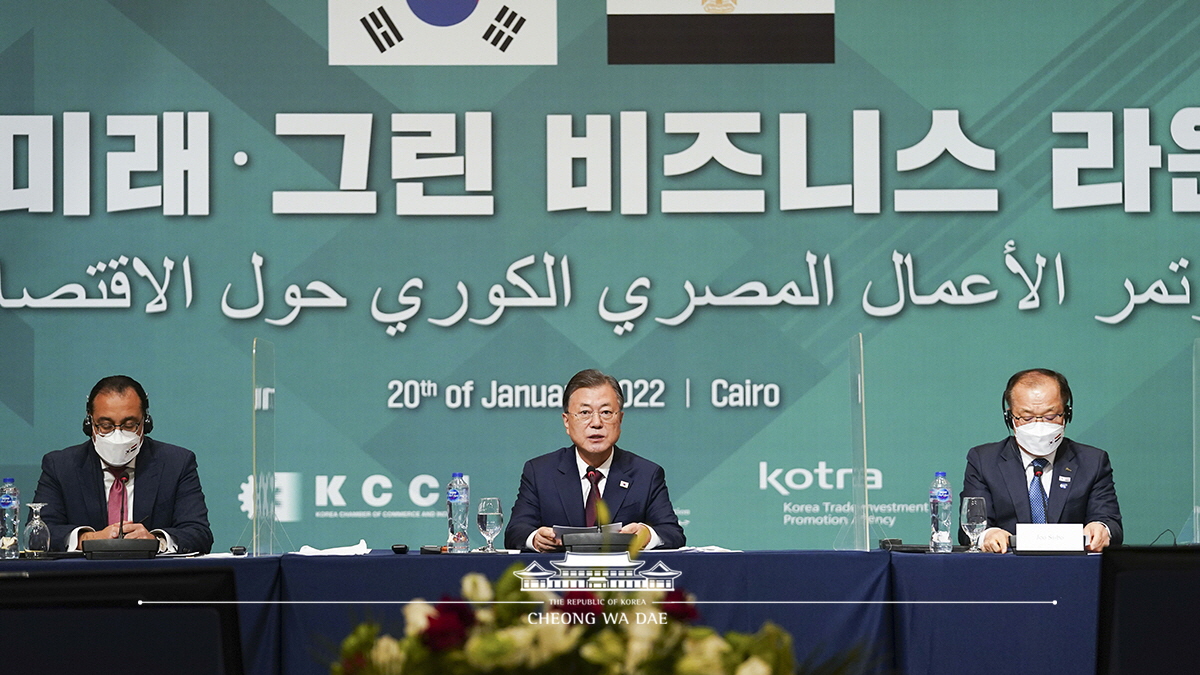이 웹사이트는 제19대 대통령 임기 종료에 따라 대통령기록관이 「대통령기록물 관리에 관한 법률」에 의해 이관받아 서비스하는 대통령기록물입니다. 자료의 열람만 가능하며 수정 · 추가 · 삭제는 불가능합니다.
다만, 「개인정보보호법」에 의하여 개인의 정보를 보호받기 원하시는 분은 관련 내용(요청자, 요청내용, 연락처, 글위치)을 대통령 웹기록물 담당자(044-211-2253)에게 요청해 주시면 신속히 검토하여 조치해 드리겠습니다. 감사합니다.
SPEECHES & REMARKS
BRIEFINGS
Remarks by President Moon Jae-in at Korea-Egypt Business Roundtable for Future Green Industries

Prime Minister Mostafa Madbouly, business leaders from Egypt and Korea, ministers of both governments,
I am glad to meet you all. Chairman Ali Helmyh Eissa of the Egyptian Businessmen’s Association and Chairman Ju Si-bo of the Korea-Egypt Economic Cooperation Council have worked hard to arrange today’s gathering for business leaders from our two countries. I am truly grateful to all of you. I hope that it will serve as a venue for solidifying trust and friendship between the two countries further and preparing for the future together.
Business leaders,
Korea and Egypt have steadily worked together since the 1970s, even before the establishment of diplomatic relations. As a result, trade between our two countries has exceeded US$2 billion, and the amount of mutual investments has reached US$800 million. The number of Korean businesses operating in Egypt has increased to 33. Korean-made automobiles are the most favored among Egyptians. In addition, a Korean company participated in the construction of the largest oil refinery in Egypt, which was completed in 2020. These are manifestations of the close economic exchanges between our two countries.
However, this is just the beginning. The Egyptian economy has infinite growth potential. As a youthful nation with half of its population at or below the age of 30, Egypt has many young, talented individuals. It is also equipped with abundant natural resources, and it has the geographic advantage of connecting three continents.
While implementing the Vision 2030 strategy, Egypt is turning its possibilities into a reality. Having attracted more foreign investments than any other country in Africa for the fifth consecutive year, the country has continued to register positive growth even amid the COVID-19 situation.
Korea hopes to pioneer a post-COVID-19 future with this rapidly growing Egypt. To this end, I’d like to emphasize three directions for economic cooperation.
First is cooperation to strengthen the foundation for trade and investment. With the Suez Canal, Egypt is a global logistics hub and has extensive FTA networks across Africa, the Middle East and Europe. When the RCEP takes effect next month, Korea will also have established an FTA cooperation network with countries whose combined GDP accounts for 85 percent of the world’s total. If our two countries’ trade and investment networks are closely linked, we will be able to advance more vigorously into the global market. The summit with President El-Sisi today resulted in the signing of an MOU on a joint study into trade and economic partnerships between Korea and Egypt. I hope this will lead to the conclusion of a mutually beneficial trade agreement between our two countries.
Second is eco-friendly cooperation. Egypt – the host of this year’s COP27 – and Korea – the host of last year’s P4G Summit – are at the forefront of the international community’s climate cooperation. Both countries are focusing on fostering green industries to turn low-carbon transitions into an opportunity to create new jobs. As we have the same goal, I also believe the synergy will be enormous.
I hope that today’s gathering will serve as an opportunity to further strengthen cooperation on electric vehicles and renewable energy. I also look forward to Korean companies being able to actively participate in eco-friendly infrastructure projects such as the construction of a new administrative capital, the installation of hydrogen-powered trams, the conversion of Suez Canal tugboats to LNG-powered ones and the desalination project.
Third is future industry cooperation. With the goal of transforming into a digital society by 2030, Egypt is concentrating its national capabilities on fostering the information and telecommunications industry. Egypt placed around 40th in Africa in terms of internet speed in 2019, but its ranking rose to 4th last year, illustrating the country’s rapidly expanding IT infrastructure. Most of all, the new smart administrative capital currently under construction will serve as an opportunity for Egypt to highlight its strengths in future industries.
Korea, with its state-of-the-art technology, is the optimal partner for Egypt in its digital transition and future growth. Beginning with the letter of intent on electric vehicle cooperation, which will be signed shortly, I look forward to our two countries identifying concrete areas of cooperation in future industries and science and technology fields.
At today’s meeting, I would like to hear your unvarnished accounts about what you have experienced in your respective fields of business. I will continue to look for ways to provide practical support while sharing your opinions with the Egyptian Government. Let our two countries join hands more firmly and move forward vigorously toward a future of mutually beneficial progress.
Thank you.



